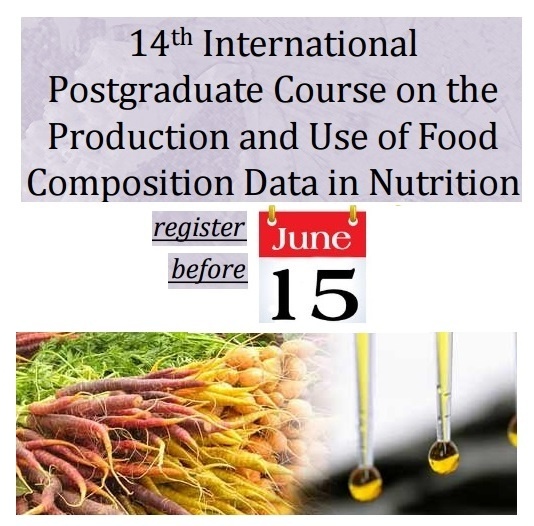Apply now! International Postgraduate Course on the Production and Use of Food Composition Data in Nutrition


A one-week training course on the production and use of food composition data in nutrition is offered by the Division of Human Nutrition of Wageningen University and Graduate School VLAG (The Netherlands) from 1-6 October 2017 (FoodComp 2017). Please register by completing the digital application form before June 15th 2017: https://nl.surveymonkey.com/r/Foodcomp2017
_________________________________________________________________________________________________
Background
Compilations of data on the nutritional composition of foods are essential tools for nutritionists, especially those concerned with monitoring adequacy of dietary intake, for linking diet to health and disease, for planning and prescription, education, food security, and for trade, export and legislation.
Objectives of course
The aim of FoodComp 2017 is to demonstrate how to produce, manage and use good quality food composition data in a standardized way, using harmonized procedures, so that the requirements of the multiple users of food composition data can be met. The course will be based on the philosophy that the preparation of nutritional databases requires close understanding of the needs of the users by both compilers and producers of data. The course will show how this understanding can be achieved and the benefits that flow from the collaboration of users, analysts and compilers.
Course structure
The course will comprise lectures, assignments, E-learning and group work and cover:
- ways in which nutritional databases are used and how these determine the range of nutrients for which values are required;
- stages in the production of a nutrient database;
- selection of foods for which nutrient values are needed;
- crop variety and nutrient composition;
- sampling procedures and the statistical aspects involved in sampling;
- choice and validation of analytical methods to give nutritionally relevant values using E-learning;
- quality control, data quality evaluation and quality management of food composition data;
- food description and classification.
Participants will become familiar with rules for data documentation as well as structures for constructing computerised relational databases.
Who should attend?
FoodComp 2017 is intended for those involved in nutritional database programmes as analysts, as compilers of food composition databases, and/or users who wish to have a better understanding of how databases are prepared and the constraints upon their use. The course will also be of value to those teaching nutrition and nutritional aspects of food chemistry and to those interested in assessing exposure from diets.
Applicants should hold a master degree in nutrition, epidemiology, food science, agricultural science or related field.
Course Secretariat
FoodComp Secretariat: Didi Talsma
Division of Human Nutrition, Wageningen University
P.O. Box 17, 6700 AA Wageningen, The Netherlands
E-mail: [email protected]
Source: United Nations System Standing Committe on Nutrition (UNSCN)
_________________________________________________________________________________________________
Related content:
The FAO/INFOODS e-Learning Course on Food Composition Data aims to close the knowledge gap on food composition of nutritionists and all those generating, compiling or using food composition data. You can download the e-learning course, access it on-line or order a CD through the FAO e-learning website. The FAO/INFOODS FOOD COMPOSITION STUDY GUIDE:
has been developed by FAO/INFOODS to reach a wide audience in need of knowledge about food composition and food biodiversity. It is intended to be used by self-learners, in conjunction with food composition courses, and by universities and schools to include food composition into their curricula. The Food Composition Study Guide is also available in French and Spanish. See also: Complimentary PowerPoint presentations to the Food Composition Study Guide in Portuguese |

